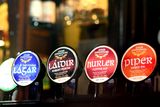Finbarr Bradley: The results are in – Irish is officially good for business
Comment





In today’s economy, the most valuable resources are often driven by the emotional heart rather than the rational mind. People search for experiences that are distinctive and palpably authentic that satisfy a longing for connection.
Given this behaviour, the Irish language is of significant commercial value. There is now strong evidence to back up this claim.
In research undertaken on behalf of third-level college Gaelchultúr, in conjunction with Amárach, a survey was taken of 1,000 people from throughout the country, in every age bracket and all walks of life. The results are undeniable: Irish is good for business.
People were asked about businesses that use the Irish language as part of their advertising and marketing activities. An impressive 73pc agree that when a business uses Irish, they assume it is local or Irish-owned. And a very healthy 26pc (36pc for under 35 year olds) are willing to pay more for the products or services from such a company.
Inis Meáin Knitwear is selling much more than clothes
Some 41pc surveyed either agree or strongly agree that they are more likely to buy products or services from a company that uses the Irish language than from one that does not.
A third strongly agree that they like to see businesses use Irish to communicate with customers even if they themselves don’t completely understand the language. And a majority listen to a radio ad or watch a TV ad and try to understand as much as they can.
Bilingualism is viewed in an overwhelmingly positive fashion. It evokes emotional associations of Irishness, tradition and locally-made. In the words of a former EU Trade Commissioner: “In a world where almost anything could be made anywhere, identity is everything.”
Read more
Very few firms grasp this opportunity to tap into consumers’ identities and pride in tradition. So why do most Irish businesses pass up such profitable opportunities?
Perhaps a legacy of colonialism and the psychological consequences of language loss have led to an inferiority complex resulting in missed business opportunities? Does a lack of appreciation of our distinctive and rare resources retard Ireland’s creative and innovative potential? Could there be a more complex issue at play than just the absence of bilingual packaging or Irish adverts on radio or TV?
Four Provinces lager 'Déanta in gCamaigh'
The Gaelchultúr study has implications for enterprises competing domestically as well as internationally. It highlights the necessity for radically different policies to stimulate the creation and sustenance of successful globally-competitive, locally-anchored Irish enterprises.
People, in their quest for a deeper sense of self, want to spend time and money on compelling local experiences. This demand has grown out of highly informed consumers weary of globalised, mass-produced goods and services.
This trend is most evident in sectors such as food, drink, crafts and tourism, where consumers are most attracted by an emotional attachment to a particular place. Here Irish plays a vital role.
The language nurtures meaning, memory and belonging.
This flies in the face of conventional economic thinking which suggests that sense of place or rootedness is antithetical to competitiveness. Yet sustainable competitive advantage derives from resources that are rare, unique and imitable.
Thankfully, there exist a small number of enterprises that leverage Ireland’s distinctive culture to develop high-calibre, globally-competitive but locally-anchored Irish enterprises.
An outstanding example is knitwear company Inis Meáin, located on the tiny Gaeltacht island of the same name. Inis Meáin is one of the more significant knitwear companies in the world. Its competitors are other European, mostly Italian, brands that make distinctive, top-quality, artisan products.
Inis Meáin knitwear evokes emotional associations of Irishness, tradition and locally-made
To discerning buyers, beautiful quality clothing which embody a unique story and the provenance of a distinctive place is very important. The emotional and experiential connection between the customer and the authenticity of island life is crucial.
Inis Meáin is selling more than clothes. The stone walls, tiny gardens and curracha in its adverts mean it is selling the island itself too.
Inis Meáin remains true to its roots and traditions, yet is thoroughly international, cosmopolitan and competitive. It proudly displays the Irish phrase Go maire tú is go gcaithe tú é [‘May you live long to wear it’] on its website.
Ins Meáin is employing its unique cultural heritage to create value in the cutthroat global business of high-end fashion. And it does this in a place considered by the EU as ‘peripheral’ and disadvantaged at best.
Opportunities abound to indicate Irishness and nurture a sense of place. Four Provinces, a craft brewer, uses the label Déanta i gCamaigh, BÁC [‘Made in Kimmage, Dublin’] to distinguish its beers from a myriad of others.
Designer Helen James, whose best-selling range Considered is a collaboration with Dunnes Stores, generates enthusiastic customers by often using Irish language words in her homewares collection.
And restaurants with the names Pota Café, Aniar, Mamó, and more, use it to celebrate that their food ingredients are sourced locally.
The language nurtures meaning, memory and belonging. Above, Peig Sayers
Far from being anti-modern and non-economic, the Irish language and sense of place represent significant business assets especially in a world of emigrants. There is no need for marketing professionals to choose between ‘progressive’ global imperatives or ‘backward’ indigenous values.
As the number of those born abroad increases, people born here appreciate their own cultural heritage even more. In turn, many immigrants are especially keen to deepen a sense of belonging and curious to know more about the place they now call home.
Most Irish economists seem blind to the critical role that the language can play in the economy. Irish is a valuable resource with clearly positive implications for creativity, innovation and profitability. It has the potential to promote a deep sense of place, a vital component of a flourishing economy and society.
Finbarr Bradley is a former finance professor at a number of Irish universities. He is the author or co-author of several books on learning, innovation and sense of place
Join the Irish Independent WhatsApp channel
Stay up to date with all the latest news

















